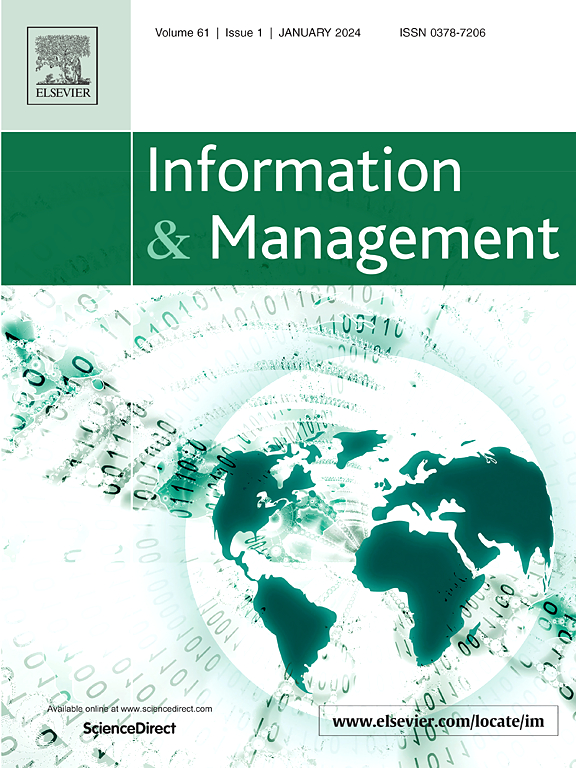“Fight for me and I will be with you”: How product deciphering app digital activism influences user loyalty
IF 8.2
2区 管理学
Q1 COMPUTER SCIENCE, INFORMATION SYSTEMS
引用次数: 0
Abstract
Although the use of product deciphering applications (PDAs)—such as Yuka and Fooducate—is becoming increasingly common, there remains a lack of research on how users perceive these apps, and specifically how PDAs’ perceived digital activism influences user loyalty. PDAs are mobile applications that allow users to scan the composition or contents of products, providing precise information about how these products may affect their health. However, users also perceive these PDAs as engaging in digital activism: advocating for users by actively promoting significant change regarding (potentially) unethical practices by certain product manufacturers. This paper investigates the mechanisms (i.e., perceived app authenticity and self-app connection) and conditions (i.e., political ideology and health consciousness) through which perceived digital activism in PDAs affects user loyalty. Four quantitative studies were conducted in France, involving a total of 832 individuals (exploratory pre-study: N₁ = 61; confirmatory pre-study: N₂ = 122; cross-sectional study: N₃ = 403; experimental study: N₄ = 246). Data were analysed using Partial Least Squares Structural Equation Modelling, OLS regression, and ANOVA. Results show that perceived app authenticity and self-app connection both mediate the relationship between perceived digital activism and user loyalty. These mediators are further moderated by political ideology and health consciousness—i.e., the effects of perceived digital activism on user loyalty via perceived app authenticity or self-app connection are stronger for liberal than for conservative users, and stronger for high health-conscious than for low health-conscious users.
“为我而战,我将与你同在”:产品解读应用数字激进主义如何影响用户忠诚度
尽管产品解密应用程序(pda)的使用——如Yuka和fooduca——正变得越来越普遍,但关于用户如何看待这些应用程序,特别是pda感知的数字激进主义如何影响用户忠诚度的研究仍然缺乏。pda是一种移动应用程序,允许用户扫描产品的成分或内容,提供有关这些产品如何影响其健康的精确信息。然而,用户也认为这些pda参与了数字行动主义:通过积极推动某些产品制造商(潜在的)不道德行为的重大改变来倡导用户。本文研究了pda中感知到的数字行动主义影响用户忠诚度的机制(即感知到的应用真实性和自我应用连接)和条件(即政治意识形态和健康意识)。在法国进行了四项定量研究,共涉及832人(探索性预研究:N₁= 61;验证性预研究:N₂= 122;横断面研究:N₃= 403;实验性研究:N₄= 246)。数据分析采用偏最小二乘结构方程模型、OLS回归和方差分析。研究结果表明,应用真实性感知和应用自我连接在数字行动主义感知和用户忠诚度之间起中介作用。这些中介进一步受到政治意识形态和健康意识的制约。通过感知应用真实性或自我应用连接,感知数字激进主义对用户忠诚度的影响在自由派用户中强于保守派用户,在高健康意识用户中强于低健康意识用户。
本文章由计算机程序翻译,如有差异,请以英文原文为准。
求助全文
约1分钟内获得全文
求助全文
来源期刊

Information & Management
工程技术-计算机:信息系统
CiteScore
17.90
自引率
6.10%
发文量
123
审稿时长
1 months
期刊介绍:
Information & Management is a publication that caters to researchers in the field of information systems as well as managers, professionals, administrators, and senior executives involved in designing, implementing, and managing Information Systems Applications.
 求助内容:
求助内容: 应助结果提醒方式:
应助结果提醒方式:


